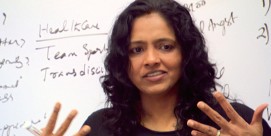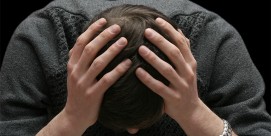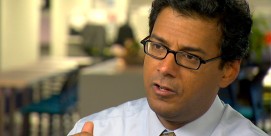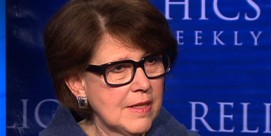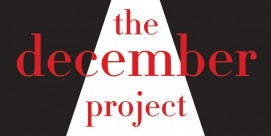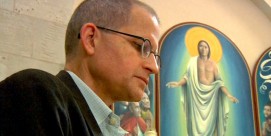In This Episode << SLIDE LEFT TO SEE ADDITIONAL SEGMENTS
Teen Hospice
BOB ABERNETHY, anchor: Now, a story about a special kind of hospice program — people who are near the end of life not only get special care, they get some of it from teenagers, who learn a lot about life by being that close to death. Lucky Severson reports.
LUCKY SEVERSON: This is a suburb of Clearwater, Florida. And a high school project that has nothing to do with how to marry a millionaire or survive on a desert island, though it is reality TV.
(to Mr. Morris): What kept you teaching?
HENRY MORRIS (Patient, “Hospice of the Sun Coast”): I like working with people.
SEVERSON: What they don’t talk about is that Mr. Morris, Henry, is dying of heart disease. That’s why the kids are here.
ANJALI SRINIVASAN (Volunteer, “Hospice of the Sun Coast”): My name is Anjali Srinivasan. I think one of the things I have learned from hospice is how important it is to celebrate your life.
SEVERSON: Anjali is part of a unique program for teenagers called “Hospice of the Sun Coast.” It’s offered in 16 Florida high schools; as many as a thousand kids have gone through the program since it started six years ago. Barbara Carrier is the Hospice Teen Volunteer Specialist.
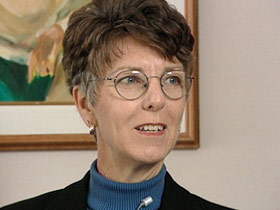
BARBARA CARRIER (Teen Volunteer Specialist, “Hospice of the Sun Coast”): The teens are coming in a little bit of Pollyanna — that life is good and I am immortal and this will never happen to me.
CHRIS GODDARD (Volunteer, “Hospice of the Sun Coast”): My name is Chris Goddard. Through hospice you really learn how important life is.
SEVERSON: One of the things the kids do is videotape interviews with people who are dying, like Henry. A priceless recording for Henry’s family, thoughts and stories and words of wisdom.
Mr. MORRIS: I always go into a situation with a positive attitude. I always look for the best in everything.
SEVERSON (to Mr. Morris): Has this helped you?
Mr. MORRIS: Oh, it’s been tremendous. They are very helpful.
Ms. SRINIVASAN: I get to hear about personal stories and maybe Mr. Morris can tell me something, that in his life he wished he had done something differently, and I can take something from that and I walk away with a lesson in life.
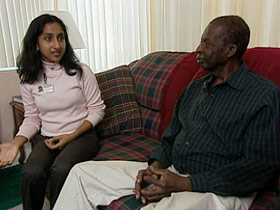
Mr. GODDARD: I like it because lots of times just during my life I feel like I am not really doing anything for anyone else. I feel really selfish sometimes just, like, going to school, like, spending time in my room, like, doing homework and other stuff. And I like to get involved with hospice because I feel like I can do something for other people.
SEVERSON (to Ms. Srinivasan): How has it changed your view of death?
Ms. SRINIVASAN: It’s made me realize it’s a part of life as much as I probably initially denied it. It is just one more level, and I think I am a whole lot more comfortable with the idea after my experience with hospice.
Mr. GODDARD: When you come to see the people and you see that they are not really as bothered by it as you would expect them to be, it’s just the next step that is coming up. And it makes me a lot less fearful of what might happen later.
SEVERSON: The kids who do this are screened pretty carefully. Some discover it’s more than they can handle. But most hang in there, some throughout high school.
NANCY MCDANIEL (Patient, “Hospice of the Sun Coast”): It started of course with breast cancer, but it has spread. I have some in my chest.
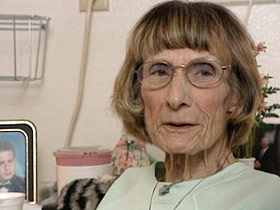
SEVERSON: Nancy McDaniel has come to the hospice to spend her final days. Along with her daughter Barbara, she has some new best friends who have helped her put together a picture book of memories.
Ms. MCDANIEL (Patient, “Hospice of the Coast”): These turned out just beautifully.
KINNARY PATAL (Volunteer, “Hospice of the Sun Coast”): I am Kinnary Patal, and the thing I have learned mostly about death is to appreciate life as it is.
NIKI PATRAWALA (Volunteer, “Hospice of the Sun Coast”): My name is Niki Patrawala. The most important thing I have learned from hospice is that like with dying, cherish what you have, like your family and friends.
SEVERSON (to Ms. McDaniel): What do you think of this project?
Ms. MCDANIEL: The girls have been perfect. They’re so polite and kind. I’d take them as my own if I could.
Ms. PATAL: When we go through pictures she would tell me about her life. I love hearing stories, and she had many to tell, many to tell.
Ms. MCDANIEL: This scrapbook has meant a great deal to me. I shall treasure this as long as I live. To me it is almost like a Bible.
SEVERSON: You hear so much, I don’t know what they call your generation — that it is all about music and clothes and success and cars — but apparently that’s not true. Apparently it is about other things as well.
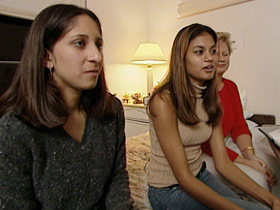
Ms. PATAL: It’s all on the exterior, but deep down people really do care.
Ms. PATRAWALA: I feel the importance of, like, compassion and helping people. I think being in the younger generation — it is important for us to do that because we can. And it is something that the elderly can gain and we can gain also.
SEVERSON: It would be misleading to imply that these are just ordinary kids. Most come from the top five percent of their class. Some say they chose hospice because it will look good on their record when they apply for college. And some kids say they need the experience to cope with their own lives.
DANIELLE RUGGIERI (Volunteer, “Hospice of the Sun Coast”): My name is Danielle Ruggieri.
SEVERSON: Danielle’s grandmother died in hospice, and three other family members have died in the last couple years.
Ms. RUGGIERI: The meaning of death. It hasn’t really changed. You just grow to appreciate their lives as long as they live.
SEVERSON: (to Ms. Ruggieri): How do you get along with Sharon? Is she pretty tough to deal with?
Ms. RUGGIERI: No, she is fun to be with . She likes going to get ice cream a lot.
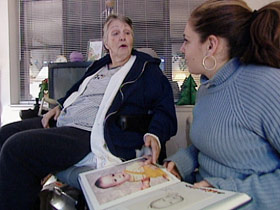
SEVERSON: Sharon Webber has Lou Gehrig’s, which is advancing on her with terrifying speed.
(to Ms. Ruggieri): Are the two of you pretty close now?
Ms. RUGGIERI: Yes.
SEVERSON (to Ms. Ruggieri): I noticed sometimes that you can finish her sentences.
Ms. RUGGIERI: Yes, you get to understand her.
SEVERSON (to Ms. Webber): Is Danielle almost like a daughter now?
Ms. WEBBER: Yes.
SEVERSON: There is simply no way to explain the bond between Sharon and Danielle, and how they both derive something deep and lasting from their friendship.
(to Ms. Ruggieri): You’ll miss Sharon, won’t you?
These are the tears of a kid who is years ahead of her friends and most adults. A kid who appreciates the moment, as long as it will last. Kendra Polachy is Volunteer Programs Coordinator.
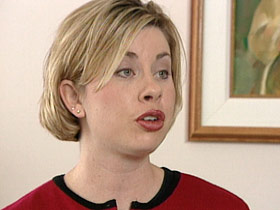
KENDRA POLACHY (Volunteer Programs Coordinator, “Hospice of the Sun Coast”): I think it opens their eyes[, the realization] of, “I am not invincible. And this could happen to me and this could happen to my family and I need to be prepared,” and you will hear students’ talk that “every day is a gift,” or “I feel really good about what has happened today.” Or maybe that test wasn’t all that big of a deal.
KEVIN HUMPHREYS (to Catherine Christy): How are you doing? Hi, I am Kevin Humphreys. And I think the one thing I am going to take away from this is that attitude is everything in life.
KYLE HUMPHREYS: Hi, my name is Kyle Humphreys. The most important thing I have learned is it is not really how long you live or how much money you have made or anything like that. It is what you make of it.
CATHERINE CHRISTY (Patient, “Hospice of the Sun Coast,” to Kyle): Why are you sitting over there when you can sit here with me?
KYLE HUMPHREYS: It’s pretty hard to believe, but you really do get close to people.
SEVERSON (to Kyle Humphreys): That’s good and bad, right?
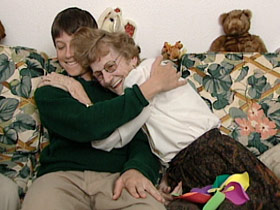
KYLE HUMPHREYS: Yeah, the bad side of it is sometimes they go. That’s the hard part.
Ms. CHRISTY: It really isn’t, because hospice keeps you at peace and when you die it’s okay. It’s okay so you never have to worry about dying.
KEVIN HUMPHREYS: That’s what they can teach us. They, you know, she really is showing a lot more courage than I probably had to in my life in just waking up and choosing to make every day good and make every day happy for yourself.
Ms. CHRISTY: If you are going to get up in the morning and be gloomy, you hurt everyone around you.
KEVIN HUMPHREYS: That’s a good lesson to learn. I am sure I am going to keep that the rest of my life.
SEVERSON: Kyle has only been with hospice for a year; his older brother Kevin, over three years.
KEVIN HUMPHREYS: You can learn a lot about yourself from listening to other people. It’s been pretty important to me.
Ms. CHRISTY: And you get a better viewpoint of older people.
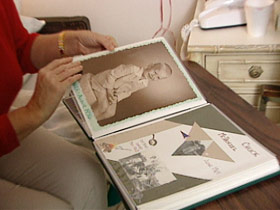
KEVIN HUMPHREYS: Exactly. I learned that old people just aren’t a hazard on the roads slowing me down.
KYLE HUMPHREYS: You feel good when you come home. And I hope they feel good after my visit.
Ms. CHRISTY: I think I am going to cry.
KYLE HUMPHREYS: It is kind of special. Everyone in their lives should have something like this.
SEVERSON: Whatever their reasons, their motivation, all of the kids we spent time with are not the same as they were before they started spending their afternoons with hospice patients.
For RELIGION & ETHICS NEWSWEEKLY, I’m Lucky Severson in Clearwater, Florida.
ABERNETHY: We are sorry to report that Nancy McDaniels, the woman who helped make the scrapbook of her life, died last week.

